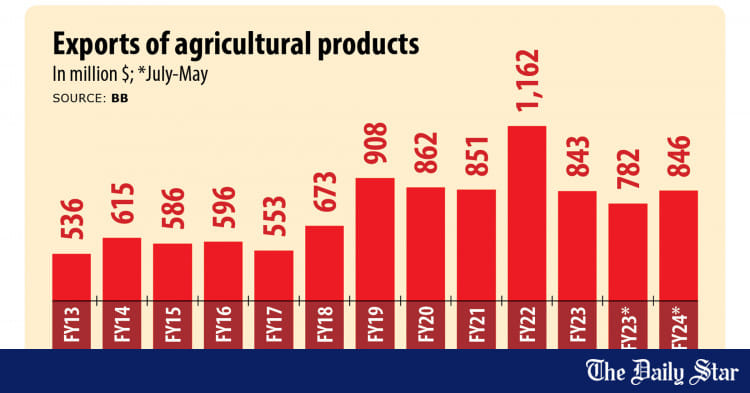- Copy to clipboard
- Thread starter
- #81

Banks release Tk 30,104cr in farm loans in 10 months
Banks disbursed Tk 30,104 crore in agricultural loans in July-April of the 2023-24 financial year, which accounts for 86 per cent of the total disbursement target for FY24, according to Bangladesh Bank data...
 www.newagebd.net
www.newagebd.net
Banks release Tk 30,104cr in farm loans in 10 months
Staff Correspondent 14 July, 2024, 22:26

Banks disbursed Tk 30,104 crore in agricultural loans in July-April of the 2023-24 financial year, which accounts for 86 per cent of the total disbursement target for FY24, according to Bangladesh Bank data.
The recovery amount of agricultural loans reached Tk 28,949 crore in the 10 months of FY24, which was 7.66 per cent higher than that of the same period of the preceding year.
The disbursement target for agricultural credit in FY24 was Tk 35,000 crore, an increase of 13.6 per cent from the previous financial year's target of Tk 30,811 crore.
The outstanding balance, including interest, stood at Tk 56,487 crore in July-April, marking a 9.35-per cent increase from the previous financial year.
Overdue of agricultural credit stood at Tk 9,994.9 crore at the end of April 2024, which is 43.83 per cent higher than the overdue of Tk 6,949 crore at the end of April 2023.
State-owned commercial banks and specialised banks aimed to disburse Tk 12,030 crore, while private banks and foreign commercial banks targeted to release Tk 22,970 crore in farm loans in FY24.
Crop sub-sector received 45 per cent of the disbursed credit, followed by live-stock and poultry 24 per cent, fisheries 15 per cent, others 10 per cent and poverty alleviation 6 per cent.
In April 2024, Grameen Bank and 10 large non-government organisations disbursed Tk 12,584.73 crore as microcredit and recovered Tk 15,030.21 crore.
As agriculture plays a vital role in the country's economy, issuing credit to farmers has become crucial to keeping the agriculture-based rural economy vibrant, especially amid the ongoing global economic crisis.
More than 40 per cent of the country's workforce is directly employed in the agriculture sector.
Farm loans enable farmers to invest in inputs like seeds, fertilisers and machinery, leading to increased productivity and economic growth.
Farm loans also contribute to rural development by providing income opportunities and improving infrastructure in rural areas.
On May 22, 2022, the central bank instructed the country's banks to disburse agricultural credit at a concessional interest rate of 4 per cent for cultivating import substitute crops, including pulses, oilseeds, spices and maize.
In FY23, farmers received Tk 32,829 crore in loans and repaid Tk 33,010 crore.
Most of these loans were channelled through NGOs, which charge interest rates ranging from 24 to 30 per cent.
To address the challenge of reaching remote areas, banks allocated loan amounts to NGOs.
To encourage direct lending to farmers, the Bangladesh Bank has instructed banks to disburse a minimum of 50 per cent of their total disbursements through their own channels.
Staff Correspondent 14 July, 2024, 22:26
Banks disbursed Tk 30,104 crore in agricultural loans in July-April of the 2023-24 financial year, which accounts for 86 per cent of the total disbursement target for FY24, according to Bangladesh Bank data.
The recovery amount of agricultural loans reached Tk 28,949 crore in the 10 months of FY24, which was 7.66 per cent higher than that of the same period of the preceding year.
The disbursement target for agricultural credit in FY24 was Tk 35,000 crore, an increase of 13.6 per cent from the previous financial year's target of Tk 30,811 crore.
The outstanding balance, including interest, stood at Tk 56,487 crore in July-April, marking a 9.35-per cent increase from the previous financial year.
Overdue of agricultural credit stood at Tk 9,994.9 crore at the end of April 2024, which is 43.83 per cent higher than the overdue of Tk 6,949 crore at the end of April 2023.
State-owned commercial banks and specialised banks aimed to disburse Tk 12,030 crore, while private banks and foreign commercial banks targeted to release Tk 22,970 crore in farm loans in FY24.
Crop sub-sector received 45 per cent of the disbursed credit, followed by live-stock and poultry 24 per cent, fisheries 15 per cent, others 10 per cent and poverty alleviation 6 per cent.
In April 2024, Grameen Bank and 10 large non-government organisations disbursed Tk 12,584.73 crore as microcredit and recovered Tk 15,030.21 crore.
As agriculture plays a vital role in the country's economy, issuing credit to farmers has become crucial to keeping the agriculture-based rural economy vibrant, especially amid the ongoing global economic crisis.
More than 40 per cent of the country's workforce is directly employed in the agriculture sector.
Farm loans enable farmers to invest in inputs like seeds, fertilisers and machinery, leading to increased productivity and economic growth.
Farm loans also contribute to rural development by providing income opportunities and improving infrastructure in rural areas.
On May 22, 2022, the central bank instructed the country's banks to disburse agricultural credit at a concessional interest rate of 4 per cent for cultivating import substitute crops, including pulses, oilseeds, spices and maize.
In FY23, farmers received Tk 32,829 crore in loans and repaid Tk 33,010 crore.
Most of these loans were channelled through NGOs, which charge interest rates ranging from 24 to 30 per cent.
To address the challenge of reaching remote areas, banks allocated loan amounts to NGOs.
To encourage direct lending to farmers, the Bangladesh Bank has instructed banks to disburse a minimum of 50 per cent of their total disbursements through their own channels.












